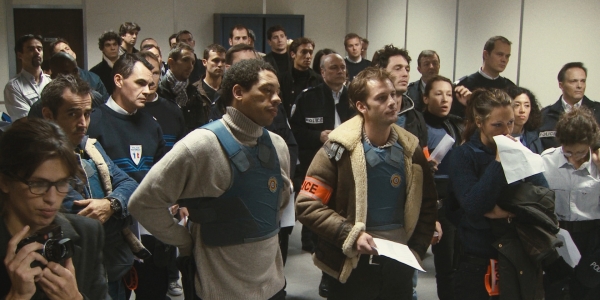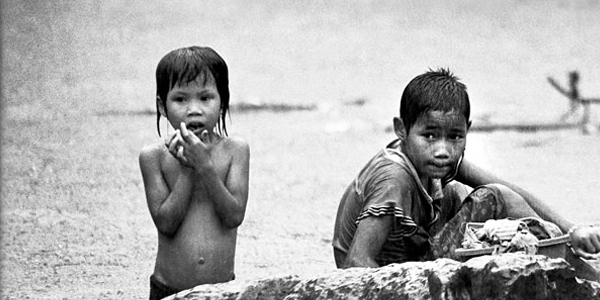Polisse is the result of a massive labour of love by 36-year-old French actress and director Maïwenn, who sought out an internship with one of the Paris Police Department’s Child Protection Units after seeing a TV documentary on their work – and subsequently channelled her experiences into the film, in which she also stars, as young photo-journalist Melissa, who is commissioned by the Police Department to do a ‘puff piece’ documenting the work of the CPU officers.
“I didn’t want to judge the policemen [and] I didn’t want to judge the victims or the guilty people,” says Maïwenn, adding that, “The cops were so on the edge, and so fragile. They all had a personal reason to work there – a brother who had been a victim, or an uncle who had been a paedophile; I always knew that they were there for personal reasons, so that makes them also a victim.”
While the visual style of the film is defined by the lo-fi hand-held aesthetics of news-crew or documentary footage, the narrative is finely wrought, interweaving Melissa’s story with those of several of the CPU officers, and handling difficult subject matter with as much levity as drama.
“I really wanted to be as close as I could to the reality,” says Maïwenn, whose internship involved shadowing officers day and night, listening to their cases questioning them about their lives. “But also you have to [temper] that reality [with drama] – you can’t just be real. Otherwise I’d be making a documentary.”
The film’s happiest moments – including a scene where the officers let off steam at the disco, and another where a bus of children recently evacuated from a gypsy squat begin to dance – were unexpectedly the ones that Maïwenn had to fight hardest to keep in the film; while those around her felt they were too unrealistic, she recognised that they provided necessary relief for the audience. In another scene – one of the film’s most confronting (and yet irresistibly funny) – three officers, while questioning a teenage girl who admits to providing blowjobs to boys who stole her phone, unexpectedly dissolve into giggles.
“I was [working within the CPU] when this girl came in and said what she [had done] for her smart phone,” the director recalls. “I have to say, the cops were not laughing like in the movie, [but] because I was [working] with them and I knew their personalities – I could feel through their eyes and through their expression that they were laughing so much inside… I [realised] after two days [of] my internship [that] they really needed to have this black humour, otherwise it’s too hard; this is the best armour they had to push away the misery. After a few days I was already using the same jokes.”
A former child actress who had two previous feature films as a director under her belt – both of which she also starred in – Maïwenn says that juggling the two roles on Polisse was nevertheless difficult, and admits that there were moments of tension between her and the cast. “It was hard to use a different energy as an actress, in the sense that when I was on the set I was the director and I needed to be the example for the crew and for the actors – I needed to always [be in] good humour, be positive – but my character [Melissa] is the opposite of that; she’s like a little cat on the sidelines, very shy, and I said to myself this is a bad decision to have chosen to be this part.”
Even with her substantial body of work and this latest film’s success, Maïwenn professes to still lacking confidence in her chosen career – something she ascribes to being an outsider from a young age. “Coming from a really poor family…and [being] one year younger than the others [at school] – I have this memory of always running around after things I didn’t have as a child: the ‘right’ jeans, the right shoes; I didn’t have a television, so I couldn’t be part of the discussion about those things.”
At the age of 12 she dropped out of school and started taking her classes by correspondence; by the age of 16, she had dropped out of the education system altogether. “I feel like it is a handicap for me now, having missed out on that sense of structure – structure for the mind – that school teaches.”
At the same time, she allows that being an outsider also contributed to her keen sense of observation. “And I had bad marks at school, I was always sitting at the back of the class,” she adds, laughing – “so maybe that helped!”
BY KIT O’CONNOR







